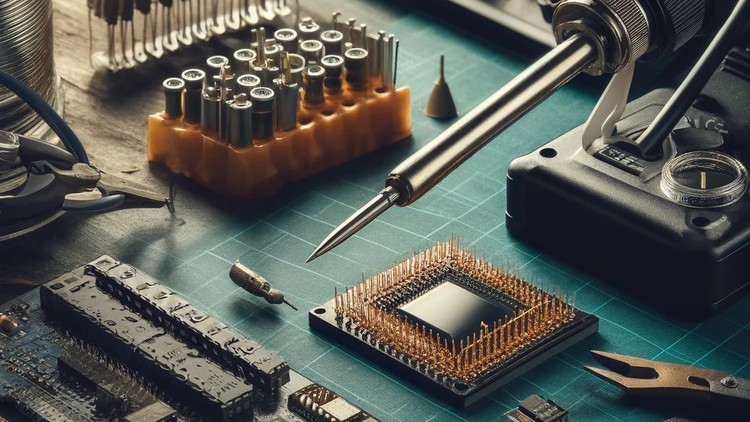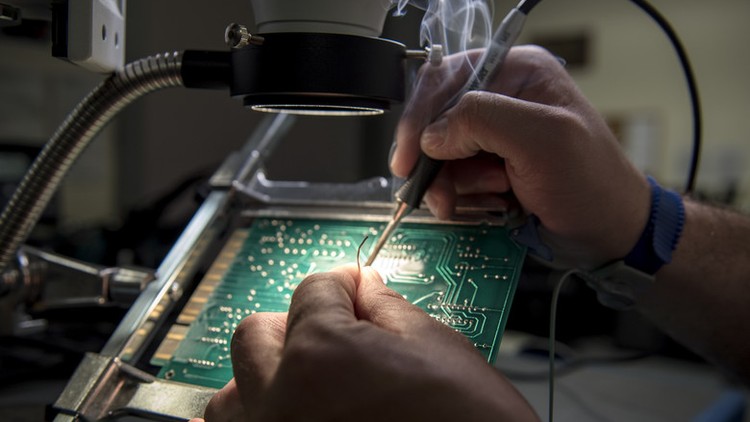This course will give you everything you need to start playing with electronics components and fix electronic devices
What you'll learn
Understand the concepts of voltage, resistance and current
Understand the VOLT OHM Meter/ Digital Multi Meter and how to use safely
Use Ohm's Law to calculate voltage, current and resistance
Use resistors in various configurations
Understand and use capacitors
Understand and use diodes
Understand and use a transistor
Requirements
A multimeter
A breadboard, jumper wires and a battery
Resistors, capacitors, LEDs, diodes, transistors, voltage regulators
Description
This Introduction to Electronic Components course is intended for those interested in learning electronics. The course introduces students to the concept of electronic components, their uses, and how they work within an electrical system. The electronics industry has been skyrocketing over the last few years as more and more people are using electrical appliances for their everyday needs. It is so important to know the basics of how these components work, as they are a necessity in modern society. Here is a step-by-step guide to help you understand what electronic components are, what they do, and how they function.
Electronic components are the building blocks of any electronic device, and they come in a wide range of sizes and shapes. These videos will walk you through some basic information about electronics so you know how to identify and use these building blocks. Practical examples are also added.
Why You Should Take This Course?
Learn how to read circuit diagrams.
Learn how to solder.
Identify parts on an electronic schematic diagram.
Become familiar with the most commonly used electronic components.
This course will give you everything you need to start playing with electronics components and fix electronic devices. It is designed so that you can quickly get started without having to spend months of your time learning lots of irrelevant information. It covers all of the basics, so even if you never plan on getting any further than this one course, you'll still learn more than enough. You will learn how to take care of the small components that are inside your electronics.
Continual Updates 4 Star | More Than 4200 STUDENTS!!! THANK YOU!!!
What Students Are Saying:
"This is a nice introduction course to those who would like to learn the basics of electronics." - André Stenberg
"It's covering the topic and establishing the basics very well." - Mike Mackley
"Great course for beginning in electronics, especially enjoyed the water analogy part to make learning easier." - Sunil Thakur
"Clear and Simple, and that is so nice :)" - Qays Qaysaneah
Topics Covered:
The Components of Electricity
Volt-Ohm-Meter Basics (Measuring Electricity)
Circuit Diagrams Basics (Electronic Roadmaps)
The Resistor
Ohm’s Law
The Capacitor
The Inductor
The Diode
The Transistor (Electronic Valves)
In this Introduction to Electronic Components Course, we will begin by discussing the three components that make up electricity. Next, we will spend more extensive time on how to measure the three components of electricity. During this section, we will explore two of the three components (voltage and current). This section will cover VOM basics and allow you to become familiar with the most important and most basic piece of test equipment.
In the next section, Circuit diagrams section, you will learn how to use electronic component symbols on an electronic road map called a schematic or circuit diagram. Many of the symbols will represent new concepts for many of you, and these concepts will be fully developed once we finish the section. As a result, you will develop the fundamentals of interpreting circuit diagrams so that these illustrations of the arrangement of electronic components can help you with the remainder of the course.
The final of the three components, resistors, will be covered next. How the three components are related mathematically is Ohm’s Law, and this fundamental law will be covered in detail. These sections make up the basic, basic material of electronics.
Four additional components common to virtually all electronic circuits are the capacitor, inductor, diode, and transistor. I will cover these topics with a level of detail that will familiarize the audience with the function of these components and the basics of how they work and react in different situations. There are text reading assignments for each section of the course.
What You Will Learn
Understand the basics of electricity and electronic components.
Read and interpret circuit diagrams.
Solder and handle electronic components.
Identify and use resistors, capacitors, inductors, diodes, and transistors.
Measure electrical properties using a volt-ohm meter (VOM).
Who Is This Course For
Beginners interested in electronics.
Students and hobbyists looking to understand electronic components.
Anyone interested in fixing and working with electronic devices.
Requirements
No prior knowledge of electronics required.
Basic tools and components (a list will be provided).
A volt-ohm meter (VOM) for measuring electrical properties.
Enthusiasm and curiosity to learn about electronics!
About the Instructor Info Educational Engineering Team
Team of skilled Engineers Sharing Knowledge with the World
Educational Engineering Team is a Leading Team in Microcontroller Industry, with over 13 Years of Experience in Teaching and Doing Practical Projects.
We strive to put all our hands-on experience in these courses. Instead of superficial knowledge - we go into the depth of the topic and give you the exact - step by step blueprint on how to tame simple as well as complex topics in easy and digestible bite-sized videos.
This real-world knowledge enables you to grasp knowledge easily, and you can apply this learning immediately to your life and projects.
Educational Engineering Team has been in the Programming and Microcontroller business since 2007. We have been part of many projects. Over the course of these years - we have gained a good insight into students’ and educators’ needs. We are passionate about sharing all our collective knowledge with you. As of 2018, we have already taught over 250k-THOUSAND students and counting.
Currently, we have more than 100+ Courses
Educator and Author of "Educational Engineering".
Ashraf is an educator, Mechatronics engineer, electronics and programming hobbyist, and Maker. He creates online video courses on the EduEng YouTube Channel (More Than 4 Million View, 20k+ Subscribers) and is the author of four Microcontroller books.
As a Chief Educational Engineer since 2007 at Educational Engineering Team, the company he founded, Ashraf’s mission is to explore new trends and technology, helping educate the world to make it a better place.
Educational Engineering offers educational courses and Bootcamps, articles, lessons, and online support for electronics hobbyists, Programming hobbyists, Microcontroller hobbyists, STEM students, and STEM teachers.
That team also works as freelancer engineers, helping many students in their graduation projects, and provide guidance and consulting for many students over the years to help them kick-start their career.
Ashraf’s core skill is explaining difficult concepts in a step-by-step, easy-to-understand manner using video and text. With over 11 years of tertiary teaching experience, Ashraf has developed a simple yet comprehensive and informative style in teaching that students from all around the world appreciate.
His passion for Microcontrollers and Programming, particularly for the world of Arduino, PIC Microcontroller, and Raspberry Pi, has guided his personal development and his work through Educational Engineering.
Ashraf’s online courses have helped over 250,000 people from around the world to be better and to make a great career in the industry.
Educational Engineering Team offers courses on
Circuit Design, Simulation, and PCB Fabrication
Arduino, PIC Microcontroller, and Raspberry Pi
Programming in C, Python, and other programming languages
PLC Industrial Programming and Automation
3D Design and Simulation
ESP and IoT World
Who this course is for:
Anyone with a need to brush up their knowledge of basic electronics
My passion is inspiring people through online courses. I love learning new skills, and since 2007 have been teaching people like you everything I know. Through my online learning business, Educational Engineering School, I create courses that teach you how to become the better version of yourself with all kinds of skills.
What would you like to learn?
Would you like to make money being an Embedded System Developer?
Would you like to build your own 6-figure business?
Would you like to learn how to code, circuit design or solder electronic components?
Would you like to make better projects?
Would you like to start an embedded system career, create great projects, kick start an idea, program, simulate, and create PCB Boards, launch a freelance career?
If you want to do any of these things, just enroll in the course. You have a 30-day money back guarantee if you don't like it. And I'm always improving my courses so that they stay up to date and the best that they can be. Check them out, and enroll today!
More About Ashraf:
I've always tried to live life presently and to the fullest. Some of the things I love to do in my spare time include football, biking, traveling to new places, watching sports (huge football fan here!), and sharing meals with friends and family.
In 2012, I graduated with my Bachelor of Mechatronics Engineering at Azhar University - one of the top schools in the country. While there, I was fortunate to make Embedded Systems project using Arduino, PIC Microcontroller and other modules. After graduating, I worked at My own university as a Teacher Assistant . I followed that stint with a contract at a local College where I discovered how amazing it is to share your knowledge offline, which made me eager and eventually found myself starting my own online learning journey. I helped more than 100k student since then. Most recently. Throughout this time I built my Educational Engineering School Online brand to teach others the skills that I have. Now I only do things I love each day.
I want to show you how to be a better Embedded System creator, make money from your skills, and live the life you dreamed of.
Educator and Author of "Educational Engineering".

From Basics to Brilliance: Your Ultimate Guide to Soldering Mastery

This course will give you everything you need to start playing with electronics components and fix electronic devices
© 2025 coursetakers.com All Rights Reserved. Terms and Conditions of use | Privacy Policy